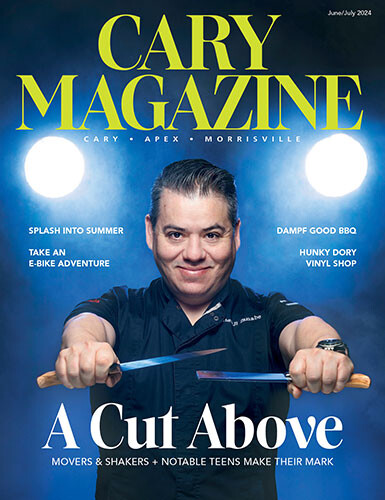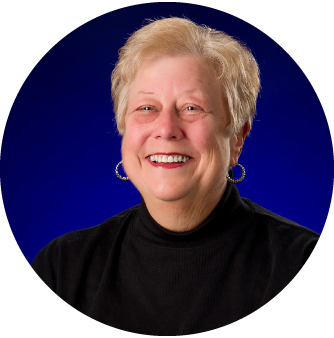Contributed By Becky Scolio, of WakeMed Hospital
Live life to the fullest. These words reflect 65-year-old Jacqueline Cotronis’ can-do attitude, which has served her well even when she faced a diabetes diagnosis and chest pain.
Like many North Carolinians, Cotronis has worked all her life. Her family lived on a farm in Fuquay-Varina, where hard work was a part of every day. When Cotronis turned 16, her father gave up farming and her family moved to the Apex area.
Later, she met and married her husband, John Norwood Cotronis, and they set up their own home in Apex. Jacqueline and John had two children — a son and a daughter — who are now grown and on their own.
Throughout her life, Cotronis has kept her mind and hands busy. She raised her children, enjoyed the outdoors and did assembly work for an environmental testing equipment firm. That is why, at age 61, she was surprised to learn that she had diabetes. “I was surprised,” she said. “I never really had health problems.”
As most people who learn they have diabetes will tell you, managing this chronic disease — like any significant life change — can be difficult. Lifestyle changes and medication in the form of pills or shots are typically necessary.
Did diabetes slow down Cotronis? Not a bit. An avid traveler, she got creative to make sure her diabetes didn’t keep her at home. “I found a special pouch that fits an ice pack and my insulin pens, so I can take them wherever I go,” she said. Even more helpful than her creativity is her positive attitude. She is determined to enjoy life and the world around her. Still a lover of the outdoors, Cotronis is often found in the garden, tearing up bushes, pulling weeds and planting flowers. She and John also take to the water in their boat for many a fishing excursion.
“A positive attitude is a tremendous help to patients,” said Dr. Rafael Moreschi, Cotronis’ physician who specializes in internal medicine and cardiology. “Positive patients are more willing to follow their physician’s recommendations. They are also more likely to take charge of their chronic illness and manage it properly to avoid complications.”
But a recent bout with chest pain threatened her otherwise positive frame of mind. “The Friday after Thanksgiving, I went to see the doctor and was diagnosed with a sinus infection,” she said . “Then on (the following) Wednesday, I started to have chest pain.”
She also had pain in her neck and between her shoulder blades. Cotronis told her daughter about her discomforts, and her daughter convinced her to call her doctor, Dr. Moreschi. An internal medicine physician and cardiologist, Dr. Moreschi quickly instructed her to go to the WakeMed Cary Hospital Emergency Department for tests. She feared a heart disease diagnosis. “I have heart disease in my family,” she said. “My mother had an artificial valve and three bypasses.”
WakeMed Cary Hospital is also home to a nationally accredited Chest Pain Program, which can be a significant advantage for patients. “Physicians and staff at accredited chest pain centers are specially trained to care for chest pain patients by following strict protocols that more predictably lead to better patient outcomes,” said Dr. Moreschi.
Once in the WakeMed Cary Hospital ED, staff members began to run tests to determine the source of her chest pain. “I had an EKG, a stress test, a Doppler, blood work, a CT scan and X-rays,” she said. “The staff checked on me all the time and told me exactly what was going on. It made me feel better.”
Cotronis stayed at WakeMed Cary Hospital for two nights. By the third day, she was pleased to learn that her chest pain was not from heart disease but from the coughing and congestion related to her sinus infection. Feeling much better, she was discharged that morning. And, instead of being rattled by her experience, she took it in stride.
“Every year at this time, my daughter and I go to Myrtle Beach for the weekend to go to shows, shop at the outlets and, if the weather allows, walk on the beach,” she said. The day after being discharged with a clean bill of health from WakeMed Cary Hospital, Cotronis went on that trip, as planned. Her vitality is a prime example of what can happen when you blend a positive attitude with advanced health care technology and expertise.
(Sidebar)
Take Chest Pain Seriously
While Jacqueline’s chest pain thankfully was not related to a heart condition, she did exactly the right thing by going to the emergency department — especially because diabetes is a heart disease risk factor. Many heart attacks begin with mild chest pain or discomfort. Often people wait too long before getting help. According to the American Heart Association, signs and symptoms of a heart attack include:
- Chest discomfort. Discomfort (pressure, squeezing, full feeling or pain) in the center of the chest lasting more than a few minutes. The pain may come and go.
- Discomfort in other areas of the upper body. Pain or discomfort in one or both arms, the back, neck, jaw or stomach.
- Shortness of breath. May occur with or without chest discomfort.
- Other signs: Dizziness, cold sweat or nausea.
Chest pain or discomfort is the most common heart attack symptom. Women are somewhat more likely than men to experience other symptoms, particularly shortness of breath, nausea/vomiting and back or jaw pain.
Learning to manage your diabetes can also help you prevent heart disease. Educational programs such as the WakeMed Diabetes Management Program are available in your area. Call (919) 350-7292 for information.






